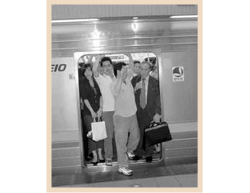
Todd Jay Leonard, Blog


The public transportation system in Japan is a marvel of ingenuity and efficiency. One can get to just about anywhere in the country by public transportation, either by train or bus.
The trains are prompt, clean and modern. If the schedule says the train arrives at 1:42, it does so - on the dot. Buses are equally as exact and adhere to schedules taking into account rush-hour traffic and winter weather conditions.
Japanese people depend upon the public transportation system of trains, subways and buses to get to and from work every day, so it's necessary that everything runs like clockwork and in an orderly fashion.
Rarely are trains delayed, but when they are - due to weather, a suicide, or mechanical failure - it throws tens of thousands of people off a perfectly timed schedule. When a delay does occur, train personnel are often at the exit wicket handing out papers to the delayed commuters explaining the delay. Commuters who are made late to work due to an unforeseen delay can show this slip of paper to their supervisors.
Especially in Tokyo, people time their commutes down to the minute, including the time it takes to walk to and from the stations. So many Tokyoites must travel from such long distances (sometimes up to two hours one way) that every minute is savored and cherished.
It is a well-known fact in Japan that fathers often leave the family home before the children are awake in the morning, and they arrive home well after the children have been put to bed. Some fathers rarely see their children during the week and only interact with them on the weekends or public holidays.
I must travel monthly to Tokyo from my home in Hirosaki on business. On these trips, I feel like I am yanked from a serene, carefree life where I am nearly always able to get a seat on a train or bus with no problem, to being jampacked like a sardine on the Tokyo trains and subways.
It is hard to imagine the mass of people in Tokyo coming and going at all times, hustling to and fro, unless you experience it personally. It is amazing, the number of people that can be crammed into a finite space.
When the train doors open, people are literally belched out - pouring forth like ants from a mound after it has been disturbed. In the early morning, on certain train routes, special "pushers" are placed strategically on the platform to help get the stragglers squeezed in as the door closes.
It certainly makes one appreciate the solitude of a leisurely commute in the comfort of an air-conditioned car, sipping a cup of coffee, while listening to a favorite CD on the short jaunt to work most people enjoy in Indiana.
For most Japanese, driving to work is not an option. The traffic jams alone would be enough to make a sane person crazy. But the real problem is what to do with the car once you arrive to your workplace. Parking in Japan tends to be quite expensive, and space for employee parking is limited (if any exists at all).
As a people, Japanese generally prefer not to have to touch people, especially strangers (hence the custom of bowing instead of shaking hands). So, you can imagine how much personal courage it takes for a Japanese person to muster when commuting during rush-hour, squashed up against perfect strangers for an hour-or-so commute.
This type of intimacy is unwillingly accepted, because it can't be helped. Having people smashed against you on all sides takes some getting used to for sure; as an American, I generally have a very clear sense of personal space and like to have an arm's length of space between me and other people. This is just not possible in Tokyo during morning rush hour.
Amazingly, though, with the mass of humanity that uses the public transportation system in Japan each day, people are remarkably polite and respectful of other passengers. The exception to this, however, is the minority of men who take advantage of the situation by improperly touching female passengers.
Until recently, women would often stand mortified, frozen with embarrassment, enduring the unwanted advances rather than fighting back. After the train stopped, they would scurry off, thoroughly humiliated.
Nowadays, women are fighting back by being more vocal and reporting lewd behavior, forcing train personnel to take action against these men. In Japanese, this type of man is called a "chikan" and is finally being dealt with on a regular basis when improper acts do occur.
Newspapers are reporting such occurrences more frequently, it seems, and the perpetrators are often middle-aged professionals in prominent positions with families. Favorite targets of these types are school girls in their school uniforms. Girls and women today, though, are much more assertive than in the past and are not afraid to single these men out on a crowded train, humiliating them completely.
The problem is so widespread that the Japan Railway Company started a system of "women-only" train cars where women can ride without fear of being molested. These have proven to be quite popular (and appreciated) by Japanese women who must travel during rush hour.
All in all, though, considering the millions of people who use public transportation on a daily basis in Tokyo, the instances of bad behavior or problems resulting from being crammed together so tightly are quite few, statistically.
This type of system - where people are forced to be in a confined area so close that one's face is practically touching another's - works in Japan because people here have learned the fine art of deference.
They have been conditioned since childhood to be polite and unobtrusive to others. This type of arrangement would not work well in most other countries, likely resulting in mass chaos, with people pushing and shoving unnecessarily and with fights breaking out for no reason.
Just one of the many reasons why I love living in Japan.
By TODD JAY LEONARD
Columnist
Public transportation can be tight during rush hour in Japan
Monday, September 25 , 2006







